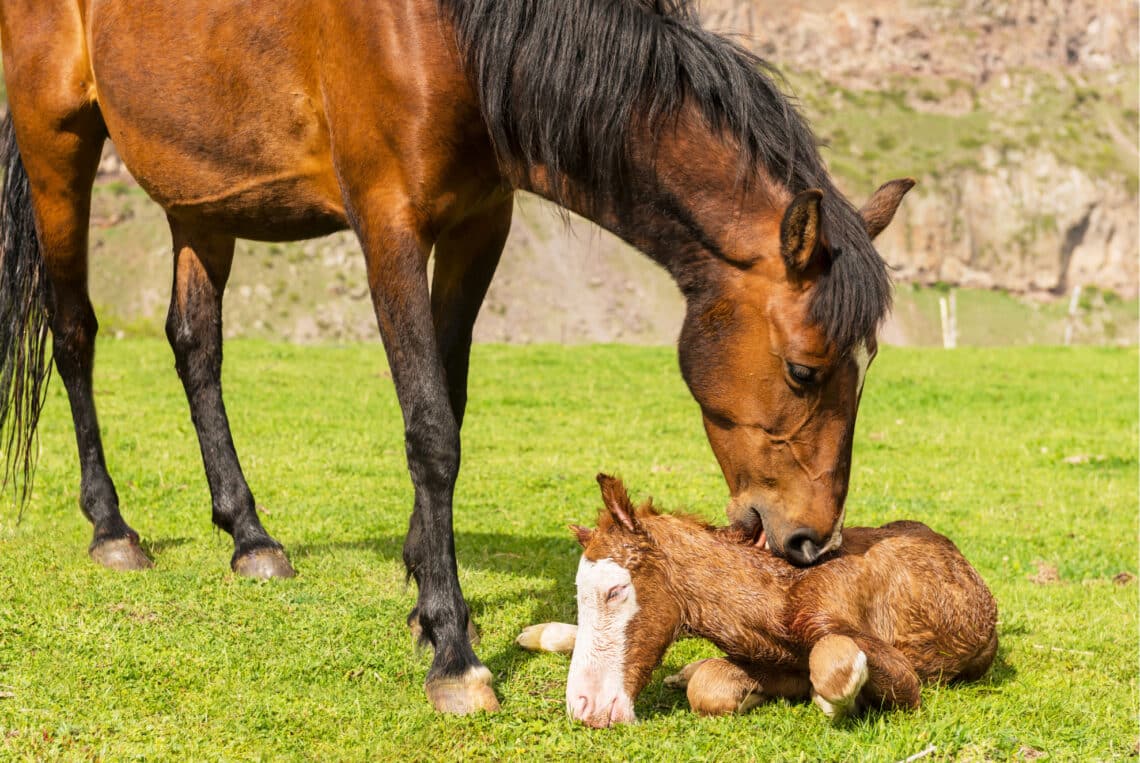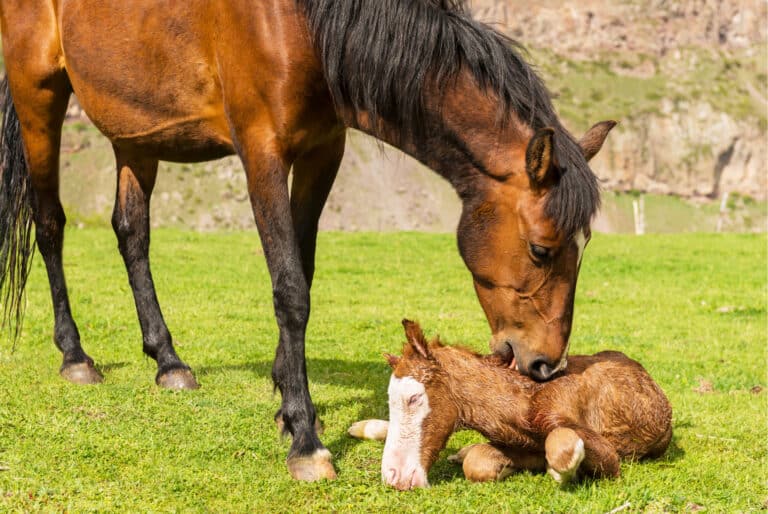
When to call the vet to your newborn foal
The arrival of a new foal is always a delight, but it is also a time when you need to be alert for signs of any problems. DR CIARAN MASTERS explains.
Your mare having a foal is a truly exciting and magical time for any horse owner. The excitement and wonder that a foal can bring is incredible, but it is also a delicate event that requires you to be vigilant and attentive. Most foalings are uneventful and happy times for all involved, and with proper care and attention the foal thrives. There are, however, some critical signs to watch for that indicate emergency veterinary attention is needed for either your foal, or mare, or both, and recognising those signs early can significantly boost their health and survival.
In general, a foal should have a temperature of 37.5 to 39°C, a heart rate of 80 to 100 beats per minute and a respiratory rate of 20 to 40 breaths per minute. If any of these indicators are not within those ranges, calling a vet is always recommended. Similarly, if a foal is born prematurely (less than 320 days gestation) it is advisable to call your vet, as the foal is at a much higher risk of complications. However, these are not the only warnings that suggest calling your vet would be a very wise choice, and listed below are a few of the other important signs you should look out for:
Difficulty breathing: This is one of the earliest warning signs that can be seen even within a few seconds of birth. If you notice any difficulty in breathing, such as gasping or laboured breaths, or if the gums and tongue are blue tinged, it’s crucial to call a vet immediately. Respiratory distress can quickly become life-threatening if not swiftly addressed. The foal may need oxygen or other interventions to help stabilise them.
Abnormal behaviour or an inability to nurse: Healthy foals should be bright, alert, and responsive shortly after birth and typically stand within an hour. Once up, they should begin nursing (drinking colostrum from the mare) soon after. In an ideal scenario the foal is up within one hour and nursing within two hours. However, there is a bit of leeway with this.
Veterinary attention is strongly recommended if the foal is not up within two hours or still not nursing after four hours. Lethargy, weakness, or uncoordinated movements can be signs of underlying issues such as infection, congenital defects, neurological deficiencies or metabolic imbalances. Nursing is vital for the foal to receive colostrum, which provides essential antibodies and nutrients critical for the immune system. To ensure the foal receives the required nourishment and to rule out underlying conditions, you should immediately ask your vet to assess the foal if they are not standing and nursing within the above time frames. Early diagnosis and treatment of these conditions can improve the foal’s prognosis significantly.
Meconium impaction: Just like rising and suckling, the foal should also pass their first faeces, called meconium, within the first few hours of life. Failure to do so can lead to impaction, causing abdominal discomfort and straining. If the foal appears to be in pain, is straining excessively, or has not passed meconium within 12 hours, veterinary intervention is again recommended. The vet may need to administer an enema, manually remove the faeces or administer other treatments to help alleviate the impaction.
Inadequate colostrum intake: As previously mentioned, ensuring a foal receives adequate colostrum within the first 12 to 24 hours is critical for their immune system. After 24 hours the foal can no longer absorb colostrum. A poor suckle reflex, an uninterested and/or unwell mare, and poor colostrum quality can influence colostrum intake. If there is any doubt as to whether the foal has nursed sufficiently, or there are any concerns about the mare’s colostrum quality (if the mare has been leaking milk excessively etc), a vet can perform a quick on-site blood test to measure the foal’s antibody levels. Supplemental oral colostrum or plasma transfusions may be used to treat deficiencies.
Deformities or injuries: Occasionally, foals are born with physical deformities or sustain injuries during the birthing process. Limb deformities and/or malpositioning, abnormal swelling, or wounds should be evaluated by a vet to determine the appropriate course of action. Early intervention can improve the chances of successful treatment and recovery. Some problems require a simple solution such as stabling, but others require more invasive therapy.
Illness or infection: Due to them not yet having a complete immune system, newborn foals are particularly susceptible to infections. Common signs of illness include fever, lethargy, diarrhea, coughing, nasal discharge and joint swelling. The early detection and treatment of infections is crucial to prevent complications. Antibiotics and/or hospitalisation may be necessary if an infection is found.
Umbilical cord issues: In a normal healthy foal, the umbilical cord should naturally detach shortly after birth, leaving a small stump that should dry up and fall off within a few days. It is always recommended to dip the umbilical cord regularly (at least once daily) in cleaning solution until it detaches. However, if the cord does not detach properly, bleeds excessively, or shows signs of infection such as swelling, redness, or discharge, immediate veterinary attention is recommended to prevent serious complications and ensure better outcomes.
Mare health: An often-overlooked complication of foaling is the health of the mare. This is vital as not only will it affect her, it can directly impact the foal as well. If the mare experiences complications such as a retained placenta (not expelled within 12 hours), excessive bleeding, or signs of infection, a vet should be called to help look after both the mare and foal. A healthy mare is essential for providing the necessary care, bonding and nutrition to the foal.
Rejection: Rejection is an uncommon occurrence (2 to 5% of mares), but it can be life threatening for the foal. A rejected foal may not only fail to receive the colostrum they need, but the rejecting mare may act aggressively towards the foal and injure them. A higher than average occurrence of rejection has been reported in first time mares and Arabian mares. Calling the vet early will not only protect the foal’s safety and health by ensuring colostrum intake, but there are techniques that can be employed to help prevent or reverse rejection, or in the worst-case scenario, to attempt surrogacy with another mare.
Knowledge of normal foal values, common foal issues including the signs to watch for, and prompt veterinary intervention can be lifesaving for a newborn foal. The first hours and days of a foal’s life are critical, and regular monitoring combined with quick action can ensure a healthy start. With this said, it is always better to err on the side of caution and contact your vet if you notice any signs of trouble or are not confident or experienced with any aspect of foal care. Your vigilance can make all the difference when ensuring your foal has the best start in life.
Dr Ciaran Masters BVetMed is an Equine Veterinarian currently working for APIAM Animal Health at Queensland’s Samford Valley Veterinary Hospital.



